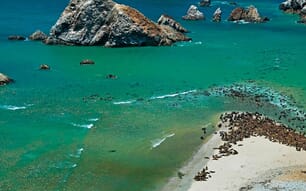
The Atlas allows viewers to visualise publicly available data relevant to marine spatial planning; including aquaculture sites, important ecological areas and marine traffic © Canada Marine Planning Atlas
Managing ocean habitats is becoming increasingly important as the impacts of climate change are felt across the world. Canada’s government is attempting to balance human activities in marine ecosystems while safeguarding key ocean resources to meet its climate targets.
As part of these efforts, Joyce Murray, Minister of Fisheries, Oceans and the Canadian Coast Guard, launched the new Canada Marine Planning Atlas (the Atlas). The Atlas is an interactive mapping tool that allows users to view and interact with data relevant to marine spatial planning. It includes data on economic, ecological and sociocultural activities that sometimes overlap in Canada’s marine spaces.
Marine spatial planning brings together all levels of government, Indigenous partners and stakeholders to shape better the objectives and future uses of marine space. It improves ocean management by ensuring our marine spaces are used in a holistic way. The impacts of human activities are considered as well as broader ecological, economic, cultural and social considerations. Coordinating how we manage ocean activities is a key factor in achieving Canada’s ambitious conservation goals of conserving 30 percent of the world’s oceans by 2030.
“It is vital to advance the goal of a thriving, sustainable ocean economy. How we utilise Canada’s oceans, especially how we protect and restore them for present and future generations, will be greatly influenced by marine spatial planning in Canada and tools like the new Canada Marine Planning Atlas. I encourage Canadians to explore this new resource to learn more about how our waters are used and to support efforts to safeguard the health of the oceans.” Minister Murray said.
As a critical tool for marine conservation in Canada, the Atlas will be featured during IMPAC5, the Fifth International Marine Protected Areas Congress, in Vancouver, Canada, from 3 to 9 February 2023. This global forum will bring ocean conservation professionals and leaders together to inform, inspire and act on marine protected areas.
Tools such as the Atlas help marine spatial planners in Canada manage conservation work with human activities and industries supporting the livelihoods of many coastal communities. This is a critical part of ensuring a sustainable ocean economy for everyone.




